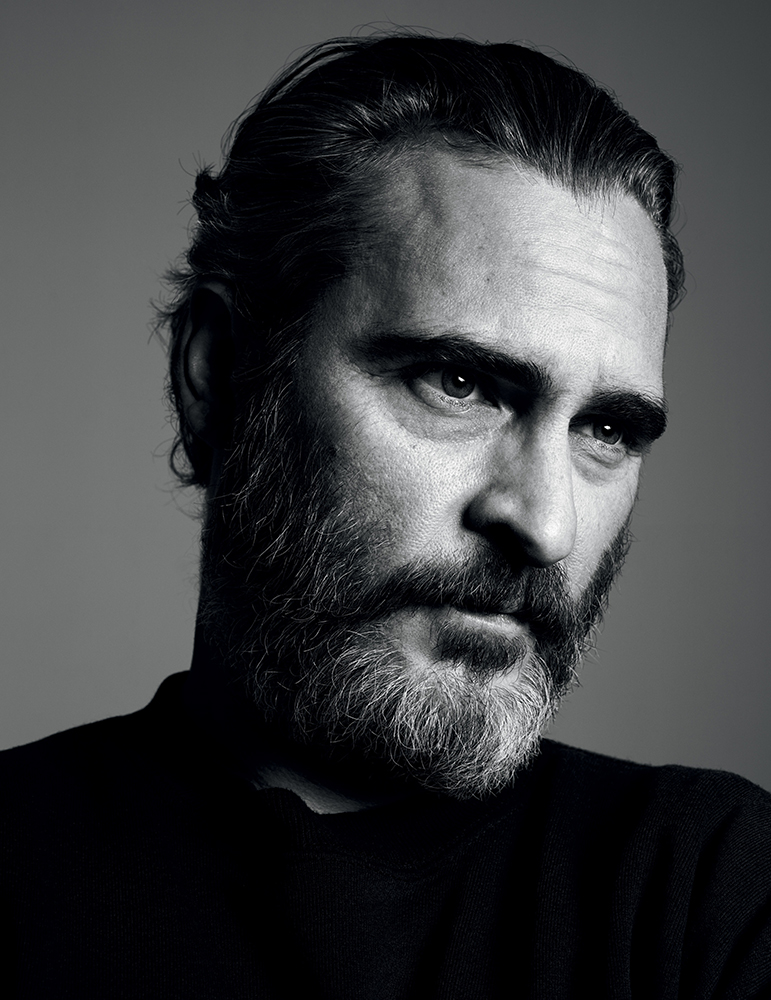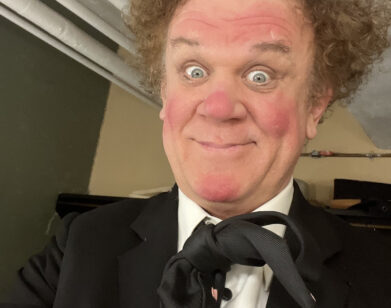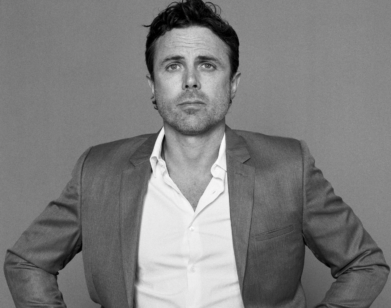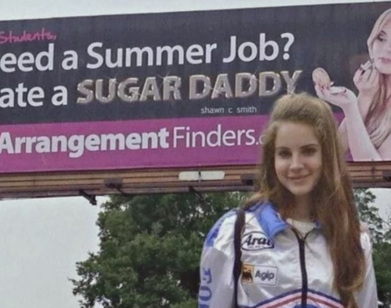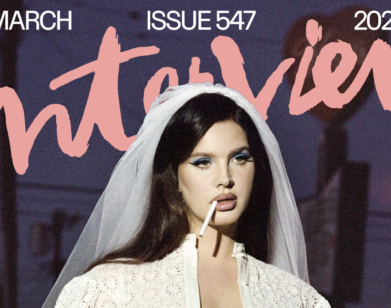Joaquin Phoenix
Nine years have passed since a dazed and slovenly Joaquin Phoenix sat on David Letterman’s couch and announced to the world that he was quitting acting to become a rapper. It’s a testament to his talent— and his eccentricity—that we believed him. Thankfully, Phoenix’s public meltdown turned out to be an elaborate hoax, documented with excruciating realism in I’m Still Here [2010], a potent assault on the celebrity-industrial complex directed by his then-brother-in-law Casey Affleck.
In fact, Phoenix was just getting started. He came back with a vengeance in Paul Thomas Anderson’s The Master [2012], as a drifter who falls under the spell of Philip Seymour Hoffman’s charismatic cult leader, earning in the process his third Academy Award nomination. The 43-year-old actor followed that up with two opposing turns: as a woebegone writer in love with an operating system in Spike Jonze’s futurist romance Her [2013] and as a volatile pimp in James Gray’s period melodrama The Immigrant [2014], his fourth film with the director. Phoenix then reteamed with Anderson to play the burnout gumshoe Doc Sportello in a 2014 film adaptation of Thomas Pynchon’s noir novel Inherent Vice, which earned him his fifth Golden Globe nomination.
This year, Phoenix continues his independent streak with appearances as an avenging Gulf War veteran in Lynne Ramsay’s You Were Never Really Here, which earned him the Best Actor award at last year’s Cannes Film Festival, and as the quadriplegic cartoonist John Callahan in Gus Van Sant’s exuberant biopic Don’t Worry, He Won’t Get Far on Foot. He’ll also star alongside his girlfriend Rooney Mara as Jesus Christ in the Biblical drama Mary Magdalene, and in the western The Sisters Brothers.
Phoenix, who was born in Puerto Rico but raised in Los Angeles and Florida, has spent most of his life in the public eye, and is known as much for his chameleonic ability to inhabit troubled and traumatized personas as he is for his own disillusionment with fame. The notoriously press-averse actor eyes journalists with skepticism, and approaches interviews with weary trepidation—even when the person asking the questions is Will Ferrell.
JOAQUIN PHOENIX: Did you know that it’s Valentine’s Day?
WILL FERRELL: I did. I’m going to a group Valentine’s Day dinner with my wife and four other friends.
PHOENIX: That sounds awful. Can I ask you a question? What is Valentine’s Day?
FERRELL: It’s a holiday, where if you have a loved one, you express love and affection in some way. For kids, they make little cards and they give them to their friends, and then some people just ignore it altogether.
PHOENIX: Did you do any kind of preparation for today?
FERRELL: The dinner tonight’s the thing, but we’re going to give everyone black roses as a little present. We thought that would be very romantic.
PHOENIX: Are they naturally black or are they dyed?
FERRELL: They’re made in China. They’re fake silk roses. Are you in L.A.?
PHOENIX: I am.
FERRELL: We’re probably right around the corner from each other.
PHOENIX: Is it cloudy outside?
FERRELL: It is. [laughs] I’ve got a lot of hard-hitting questions. I’m going to go for the jugular here. I’m going to break you down, okay?
PHOENIX: That’s easy.
FERRELL: [laughs] I’m assuming we’ve begun. I’m assuming the interview is now.
PHOENIX: Or we could call it right now. Why not? Don’t you hate when these interviews drag on and on, and it’s like, “Fuck it, I’ve got things to do. I don’t have time to sit around and read this bullshit.”
FERRELL: Let’s just call it. That would look so funny in print.
PHOENIX: I think it would be great, but what do I know?
FERRELL: I was trying to remember if we’ve ever officially met.
PHOENIX: I’m not exactly sure where it was, but I remember I was sitting at a table, and you were at another table that was higher than mine. I think you were up on an elevated platform of sorts, with fine wine being poured for you. I turned around and saw you, and I believe we shook hands.
FERRELL: I also remember the Hollywood Foreign Press shout-out where you were at the back of the room. I think you had just done a press conference, and then I was up next for whatever movie I was doing, and you interrupted and were like, “I just want to say, I’m a fan. That’s all I’m going to say.” Do you remember doing that?
PHOENIX: I don’t remember that.
FERRELL: [laughs] You did that.
PHOENIX: I don’t remember that at all, and I don’t know how we can confirm whether that really happened or not. Are you sure?
FERRELL: I’m pretty darn sure because it was a delightful interruption to those press conferences, which are always so bizarre.
PHOENIX: Particularly if you have to follow me, because I probably ruined the room.
FERRELL: You don’t have to answer this question if you don’t want to, but it’s the weirdest situation ever, right? The Hollywood Foreign Press.
PHOENIX: For me, they all are, because one person is always mad at me for being too serious, and then the next person is mad at me for not answering the question with a real answer. I’m probably so self-consumed any time I do a press conference, overwhelmed by my own feelings and thoughts in the situation. It always feels so uncomfortable and ridiculous to me, so I can’t say that one press conference is better than the other or more strange than the other.
FERRELL: Are you doing this interview to promote something specific?
PHOENIX: Honestly, I have no idea. I do appear in a few movies that are coming out at some point this year.
FERRELL: One of which, the Gus Van Sant movie [Don’t Worry, He Won’t Get Far on Foot], I saw. It’s fantastic.
PHOENIX: How did you see that?
FERRELL: I’m hopefully going to do something with Gus, and he screened it for me. Fingers crossed. I’ve always loved everything he’s done, and now to spend some time with him—what a cool dude. But I have to ask you, there was a part I loved—what’s the illustrator’s name? John, uh—
PHOENIX: Callahan.
FERRELL: Yes. He would speed through town in his wheelchair, and you actually had a spill. That was not a stunt person. That was you flying off the wheelchair?
PHOENIX: Yes, but you make movies. You know how it works. They put fake cement down on the path so it looks like real cement.
FERRELL: We’re going to leave that out of the interview. Wait, I’m not a professional interviewer, so this is very scattershot. I also know that you did a film this summer with the great John C. Reilly.
PHOENIX: It’s called The Sisters Brothers.
FERRELL: Yes! Did you have to ride horses?
PHOENIX: We did.
FERRELL: Are you proficient in horse riding?
PHOENIX: I am not.
FERRELL: Do you remember the name of your horse?
PHOENIX: You motherfucker. [laughs] Well, here’s the thing: how could you even verify this?
FERRELL: You’re right, I can’t at all. I’m just curious.
PHOENIX: There were, in my defense, several horses. For one, there was a running joke because I always screwed up his name. I think it was Machinero. I used to call him Monochado. And another one was Capitán.
FERRELL: The few times I’ve done horse work, they’re always like, “Joaquin, you’ll be on Thunderbolt. Will, we’re going to give you Cinnamon here. Cinnamon’s a good old gal. She won’t give you much trouble.”
PHOENIX: There was another one, the stunt horse, that I couldn’t even look at because she was just so ferocious, her muscles constantly flexing.
FERRELL: Twitching, ready to go, full gallop.
PHOENIX: And I couldn’t do that. I mean, I didn’t like riding horses. I actually regretted having to ride. I’m a little clueless, because I don’t think that I really thought about it that much until I was there and realized, “Oh, it’s a Western and we’re on horses a lot.” I hadn’t really considered that. I felt bad about riding them. I had the feeling that they were like, “I don’t really want you on my back.”
FERRELL: But they tell you that the horses love it.
PHOENIX: Yeah, but the horses tell you something different. I’m really bumming out this interview, man. [laughs] I’m sorry.
FERRELL: You mentioned you read the script, and that it didn’t really dawn on you that you’d be riding horses. I remember that happened to me with Old School [2003], with a scene where my character streaks naked down the road, and I was like, “Oh, that’s a funny joke.” And then it came to the night that I had to shoot it. [both laugh] On a city street, in front of a lot of crew, and extras, and people in the street. And I was like, “Oh, yeah, I gotta do this now.” Those things can sneak up on you.
PHOENIX: The strange thing is that often I will fixate on things that, by the time I actually start shooting, seem really inconsequential, but for some reason, I think, “This is the scene that I’m worried about, this is what’s going to require the most work or struggle.” And then I completely miss the things that really end up being the most demanding. There’s almost always that moment the night before a scene when you go, “Wait a second, what? What are we shooting? I didn’t even remember this being in the script! This is something I’m actually doing?”
FERRELL: And you’re jumping out of a plane.
PHOENIX: [laughs] Yeah, exactly.
FERRELL: Except that would be hard to miss, but I know what you’re saying.
PHOENIX: Good. We’ve got to understand each other.
FERRELL: [laughs] Let me ask you this. I’m terrible at giving advice. I always feel like I’m letting people down when I’m asked professional advice about the biz. How do you feel about your ability to give advice?
PHOENIX: Nah, I got nothing.
FERRELL: Let’s say I come up to you like, “Hi, my name’s Bob, and I’m a struggling actor from Kansas City. I really admire your work. Do you have advice for me?” Do you just say, “Hey, Bob. Uh, keep going for it. I don’t have any advice”?
PHOENIX: I mean, “Keep going for it” is advice.
FERRELL: [laughs] Do you give them a slogan, like, “Reach for the stars”? Isn’t it awkward?
PHOENIX: Mostly I feel bad. [John C.] Reilly’s advice is, “Go pee first.” [laughs] I’ll say, “What do you mean, ‘Go pee first?’” And he’s like, “Well, before you go on set, you should pee.”
FERRELL: That’s very practical. How sick are you of the questions, “What drew you to the role? How did you prepare for it?”
PHOENIX: I understand why somebody would ask that question, but I don’t have a good answer because I don’t know how I choose; it just happens.
FERRELL: There are so many different ways that things can find their way toward you, or you find them. I’m always making up that answer when I’m asked that question.
PHOENIX: I usually have a very strong desire to participate in an experience, and then shortly thereafter, I have an overwhelming desire to move as far away from it as possible. And then I try to get out of doing it.
FERRELL: That’s your pattern, right? As it gets eminently closer, you’re like, “You know what? Maybe get someone else.”
PHOENIX: What usually happens is I start to think about other actors who would be so much better than me.
FERRELL: But you’re so good!
PHOENIX: “I’m going to ruin this movie! This is a great director’s great script, and I’m just going to fuck everything up. They should get someone else.”
FERRELL: [laughs] Oh, that’s great.
PHOENIX: It’s horrible, actually.
FERRELL: You’re very good, I’m just telling you.
PHOENIX: Well, thank you, but I don’t really know what your taste is. You might have terrible taste.
FERRELL: I love everything. I was recently thinking about your role in Gladiator [2000], which is a big studio movie.
PHOENIX: Are you reading off prepared questions and trying to pretend that they’re just popping into your head?
FERRELL: Maybe wait to hear what I have to say: I was thinking about your role in that movie, and the reason why it works is because you’re such a little bitch.
PHOENIX: [laughs] I don’t know if that’s why the movie works. It probably had something to do with Ridley Scott.
FERRELL: In your personal life, are you sometimes a little bitch?
PHOENIX: Be more specific.
FERRELL: Can you get a little bitchy if you’re in a bad mood?
PHOENIX: Definitely. You can ask Reilly about that. I think I tortured him the first couple of weeks, maybe the entire shoot.
FERRELL: [laughs] You have another movie coming out where you’re going to be playing Jesus Christ. You and I have both played Jesus in major pictures.
PHOENIX: Is that right?
FERRELL: Yes. In the movie Superstar [1999], starring Molly Shannon as her Mary Katherine Gallagher character, I come to her as Jesus in a vision.
PHOENIX: What drew you to that role? How did you prepare for it?
FERRELL: You know what, it was all about blue contact lenses. That was it. I was the hunky heartthrob that she loved, and she was dreaming about me. Of course, I was playing a high school kid, at age 32. I come to her, and I appear as that character, but now I’m Jesus as well, in a vision.
PHOENIX: That sounds beautiful.
FERRELL: When you worked with M. Night Shyamalan, did you ever just once call him M. Night Shyamalamadingdong?
PHOENIX: No.
FERRELL: Okay. How would he have reacted if you were like, “Hey! M. Night Shyamalamadingdong! Can I ask you about this one camera shot?”
PHOENIX: Having been teased most of my childhood about my name—
FERRELL: You’re sensitive to that area.
PHOENIX: [laughs] Yeah.
FERRELL: Fair enough. How much do you love photo shoots? You love them, don’t you? Like a good six-hour photo shoot for a magazine?
PHOENIX: I imagine that in all of my photos, I seem uncomfortable. What about you?
FERRELL: I’ve finally learned to say, “Yeah, let’s just do it in two hours.” And somehow they get it done.
PHOENIX: I’ve always wondered what it’s like to be on a reality show, where you go on a first date, and that’s what this conversation feels like. I feel like I’m trying to do this first date and get to know you, and be natural, and just have a conversation, but I am also aware in the back of my mind that we’re being recorded. I feel like I want to get to know you, but also want to make sure that I look good, and I have my hair right. Did I wear the right jacket? I should’ve worn denim. Is denim cool? I don’t know how to present who I am, and now I feel bad about that.
FERRELL: This is good shit. Here’s another thing I want to ask you about: I read how you’re not on social media, and I love that your answer was, “Because I’m 42.” I just had a big meeting with agents who were trying to get me to be on social media, and I literally said, “If I have to get on social media, then I’ll just leave the biz.”
PHOENIX: I just have absolutely no desire. I wouldn’t know what to do.
FERRELL: I tried Twitter for four days, and it was too much to try to think of something to say every day. And then I was doing a charity tennis thing, and I was promoting the charity tennis thing on Twitter, and there was backlash: “That’s not what Twitter is for!” I read all this negative stuff, and then I was like, “You know what? I’m good.”
PHOENIX: I haven’t even dipped my toe.
FERRELL: Part of me wants to lead a crusade on social media to get rid of social media. #ShutItDown.
PHOENIX: #DefeatItsOwnPurpose.
FERRELL: Will you join me if I crusade?
PHOENIX: No, I don’t understand the point of that. You don’t eat bananas to say that bananas are no good to eat.
FERRELL: Bananas are good to eat, though.
PHOENIX: Having bananas around the house is like having kids. I don’t have kids but I have nephews, and I grew up in a big family with a lot of kids, and I have to say that the smell of rotting bananas seemed to permeate the household throughout my entire childhood. [Ferrell laughs] And I feel like, if you wanted to know what it’s like to have kids, you could get a banana and throw it on your bed for a few weeks, then you’d kind of know what you’re going to be dealing with. Because bananas are basically—that’s what toddlers eat, right?
FERRELL: We have kids, and we have a lot of bananas—even though I’m not sure if our kids even like bananas. Did you watch the Super Bowl, by the way?
PHOENIX: I did not. Oh, you know what? I watched the last minute. Somebody was like, “Oh, this is amazing,” and I turned on the last minute. I didn’t even know it was happening until somebody told me.
FERRELL: [laughs] Well, next year I’ll invite you over to watch the Super Bowl.
PHOENIX: You don’t have to.
FERRELL: You don’t even have to watch it.
PHOENIX: I’m trying to do this thing where I’m being honest with people—I don’t want to come. But I’d love to come over to check out your bananas sometime.
FERRELL: Wait, say that again? You’re doing this thing where when you really don’t want to go somewhere, you just say, “I’m not going to go”?
PHOENIX: I’m tired of making excuses.
FERRELL: It’s okay as an adult to say, “No, I’m not going. I just don’t want to go.”
PHOENIX: Yeah, I mean, it is okay, but, just that, I have to, yeah, I can’t do it. [Ferrell laughs] It’s very nice of you to offer, but I won’t be doing that.
FERRELL: Do you not watch sporting events in general?
PHOENIX: Not really. I’ve never understood football. In my late thirties, I realized there is a defense and an offense, and they are different players. [Ferrell laughs] I’m serious.
FERRELL: We have three boys who are very much into sports, and they’re like, “We’re watching the Super Bowl, right Dad?” Even though we have no affiliation with the two teams who were playing. But there was such disdain for the New England Patriots because they’ve won it so many times that everyone at our house was pulling for the Eagles as if that was our home team—screaming and yelling and falling over and hanging on to every play. [Ferrell to his wife] Oh, hello.
PHOENIX: This is so fucking unprofessional. I can’t believe you’re doing this. [Phoenix to his dog] Come here. Honey, come here.
FERRELL: How many dogs do you have?
PHOENIX: I have a dog, and my girlfriend has a dog.
FERRELL: So there are two. Do they get along?
PHOENIX: They do, and I was actually quite concerned about it because my dog is amazing with people, but sometimes doesn’t do well with other dogs. It was a long process to get them—
FERRELL: To co-exist.
PHOENIX: But now they’re best friends. We were all curled up last night, and it was super sweet.
FERRELL: Well, I think we’ve covered all the pertinent topics.
PHOENIX: I think we should’ve ended it in the beginning.
WILL FERRELL IS A LOS ANGELES–BASED ACTOR, COMEDIAN, AND PRODUCER.

